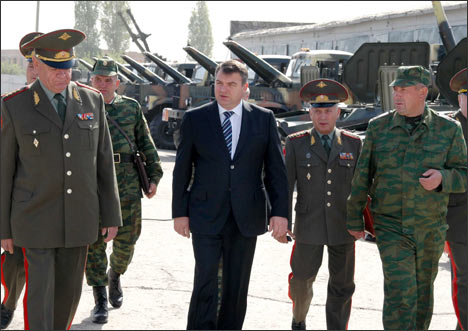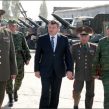
Serdyukov Dreams of Network-Centric Conscripts
Publication: Eurasia Daily Monitor Volume: 9 Issue: 2
By:

In his recent year ender interview, Russian Defense Minister Anatoliy Serdyukov provided a relatively smoothly crafted overview on the course of the reform launched in the fall of 2008 and the ongoing efforts to modernize weapons and equipment. Serdyukov’s comments to Rossiyskaya Gazeta addressed problems in the 2011 State Defense Order, military pay, benefits, apartments, opposition to reform, manpower issues and the planned introduction of Military Police. Most of the minister’s remarks were a bland rehash of former statements, talking up the reform in a presidential election period, though some aspects were unusual. These related to crucial challenges facing the reform in terms of devising mechanisms to deal with dedovshchina, which Serdyukov carefully avoided mentioning overtly and the future manning of the “permanent readiness” brigades (Rossiyskaya Gazeta, December 21).
There was no glowing report concerning the planned new generation of Non-Commissioned Officers (NCOs), now largely consigned to an ongoing small-scale experiment in Ryazan to train NCOs in courses lasting two years and ten months, instead Serdyukov turned to the imminent appearance of Military Police. The Main Directorate of the Military Police has been established, their training, pay and jurisdiction worked out, and their task it seems is to tackle “hooliganism” in the barracks. The minister prefers this euphemism due to his conviction that dedovshchina no longer exists, having apparently evaporated after reducing the terms of conscript service to twelve months. Evidently, Serdyukov fails to appreciate how central dedovshchina remains to life in the Russian barracks, but this “hooliganism” needs to be somehow controlled; and Military Police will be expected to perform this role (Rossiyskaya Gazeta, December 21).
It is open to question as to how successful this initiative may prove in offsetting the sharper end of dedovshchina, though there are rather puzzling elements to the proposed recruitment policy. By his own admission, among the more controversial aspects of the reform was the officer downsizing, which originally aimed at reaching 150,000 in the scarcely believable manpower total of “one million,” but was later adjusted to 220,000. Part of that rapid downsizing involved the novelty of placing thousands of officers at the disposal of their commander, a type of limbo that meant they were not in the table of organization and equipment, but neither fully out. Some Military Police will be recruited from among these limbo officers. Consequently, Serdyukov’s vision for dealing with “hooligans” is to partly police them with the disaffected (Rossiyskaya Gazeta, December 21).
While the Military Police innovation awaits further development and raises expectations for improved standards of discipline, Serdyukov also spoke about the need to increase the numbers of contract personnel in the Russian Armed Forces. Mixing contract personnel and conscripts serving for twelve months in the brigades has made them harder to deploy. Finally, the Chief of the General Staff, Army-General Nikolai Makarov promised much higher numbers of kontraktniki, culminating in around 425,000 by 2017. Serdyukov essentially restated this, presenting figures suggesting that 50,000 kontraktniki will be recruited annually. He then stated the optimum contract-conscript mix would be 80 percent kontraktniki, but if money permitted the minister prefers reaching 90 percent. However, Serdyukov then made the staggering statement that the remaining conscripts could serve in the less technically demanding role of combat infantry. Given the link between the reform and modernization to the adoption of network-centric warfare capabilities, either Serdyukov was outlining a dumbed down vision for the long term future of the Russian Army, or he is simply unaware that conscripts have no role in network-centric theaters of operations (Rossiyskaya Gazeta, December 21).
The image of a reform carefully planned and proceeding despite its problems and rather limited opposition was briefly linked to reality after Serdyukov admitted that many initiatives originate from uniformed officers in the defense ministry. Nonetheless, there is clear evidence of low quality planning in shaping the reform agenda, not least in relation to observations from officers struggling to implement whatever is intended or hoped for by the defense ministry (Rossiyskaya Gazeta, December 21).
In September, the operational-strategic exercise Tsentr 2011 involved more than 12,000 troops from Russia, Kazakhstan, Kyrgyzstan and Tajikistan testing aspects of Russian military reform as well as force groupings under development in the Collective Security Treaty Organization (CSTO). Tsentr 2011 tested the newly created joint strategic command structure in the Russian Armed Forces in directing, moving and overseeing large formations and combined-arms units. Despite the predictable political claims about the exercise, some Russian officers highlighted serious flaws exposed during Tsentr 2011, including the incompatibility of communications equipment and logistical issues. Russian brigade commanders complained about the lack of new models of weapons and equipment, which would have enhanced the quality of the exercise had they been used. Although military and non defense ministry structures participated in the exercise another brigade commander noted that the communications systems did not “interface with each other,” suggesting severe problems would emerge during actual operations. Colonel Alexei Rogozin, the Commander of the 98th Airborne Division stated that Russian forces collaborating with their CSTO counterparts encountered “different mission planning workflows,” as well as varied approaches to standards and procedures for logistics. Major-General Yevgeniy Ivanov, the Military Prosecutor in the Central Military District (MD) noted that there were “only two training and indoctrination officers” for the 4,000 personnel at the Chebarkul Combined-Arms training camp, and referred to logistical setbacks: “many servicemen did not have sufficient time to purchase all the food and toiletries they needed” (Uralskiye Voyennyye Vesti, October 14; www.kremlin.ru, September 27).
The Chief of Staff in the Central MD, Lieutenant-General Sergey Surovikin, reported that during the movement of personnel and equipment to the exercise areas, concealment and cover were ignored. He also criticized some commanding officers for choosing assembly areas on the basis of convenience of location rather than “enemy” actions. Significantly, Surovikin highlighted weaknesses in the counter-terrorist dimensions of the exercise, such as a lack of skills in organizing the interaction of subunits with forces drawn from other power ministries. Staffs, in Surovikin’s view, spent too much time on paperwork than with subordinate command elements (Krasnaya Zvezda, November 16).
Although no one really expected a New Year’s resolution from Serdyukov to address many rudimentary planning weaknesses, some type of restatement of the reform agenda may be anticipated either during the presidential election campaign or shortly afterwards. The “vision” for the future of the Armed Forces must be clearly outlined to the officer corps, accompanied by greater effort to set achievable targets within a realistic framework.




